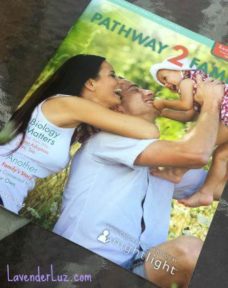 Biology Matters, And That’s Why Openness Does, Too
Biology Matters, And That’s Why Openness Does, Too
Below is an excerpt from the Summer/Fall 2015 issue of Pathway 2 Family. My article is the cover story. It aims to apply what we now know about infant adoption to the realm of embryo adoption.
Why Not Just Stick with Secrecy?
We are leaving behind the way we practiced adoption in shame and secrecy. Turns out such practices didn’t always work out so well for anyone involved, especially the child at the center. We must learn from that in embryo adoption/donation.
- With secrecy we acted as though nothing remarkable had happened in the building of our family. But it had.
- With secrecy, we assumed the baby would be a blank slate on which we could write our own story. But she wasn’t.
- With secrecy, parents may not have fully grieved their own losses, been comfortable with difficult emotions that stem from those losses, nor have been open to answering questions the child may have asked of her beginnings. If we ignored those icky feelings and pushed away those hard conversations, we once thought, they’d just go away. But they didn’t.
People used to choose secrecy out of fear. But we no longer need to.
Openness is the antidote to both secrecy and fear.
The article is part of an educational focus of Nightlight Christian Adoptions and the Embryo Adoption Awareness Center to make reproductive endocrinologists and others at their medical clinics aware of the benefits of openness between embryo donors and recipients — and more importantly why it matters for the resulting baby/child/teen/adult.
To read the full article FREE from your favorite mobile device or computer, visit Pathway2Family.org.
(I am aware that some prefer the term embryo donation.)
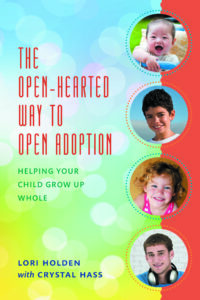
Lori Holden, mom of a young adult daughter and a young adult son, writes from Denver. She was honored as an Angel in Adoption® by the Congressional Coalition on Adoption Institute.
Her first book, The Open-Hearted Way to Open Adoption: Helping Your Child Grow Up Whole, makes a thoughtful anytime gift for the adoptive families in your life. Her second book, Standing Room Only: How to Be THAT Yoga Teacher is now available in paperback, and her third book, Adoption Unfiltered, is now available through your favorite bookseller!
Find Lori’s books on her Amazon Author page and catch episodes of Adoption: The Long View wherever you get your podcasts.

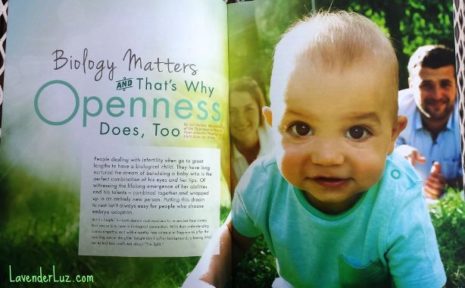
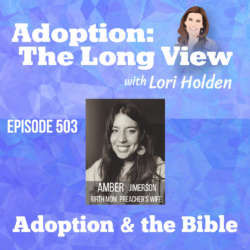
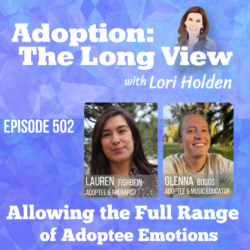
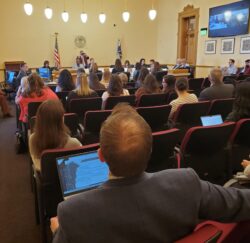
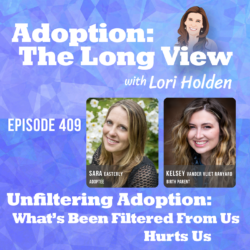
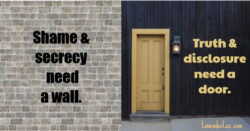
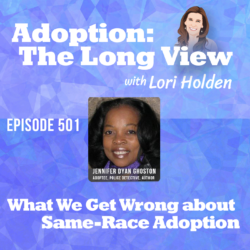
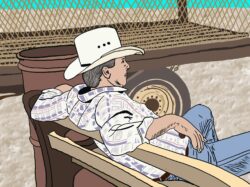
21 Responses
We considered embryo donation/adoption to build our family, although it’s not the route we ultimately wound up taking. Now we’re keeping it in the back of our minds as a potential option for our 2 frozens if we find out – after 2 losses and then a messy pregnancy with a very premature birth – that my carrying another pregnancy for any reason from the physical to the emotional isn’t in the cards.
It’s good to see the issues brought up by this new way of building families being addressed.
Katherine, I’d be curious to know your thoughts as you decide on openness with your possible frozens. And also what your clinic is saying about it. If you ever write about it, please let me know.
“Openness is the antidote to both secrecy and fear.”
I completely agree with that statement, not just in the realm of adoption, but in most areas of life.
Somewhat related – I had a girl contact me years ago, convinced I was her birth mother. Sadly, nothing I’ve said has changed her mind, and her adopted parents and relevant agencies are not forthcoming with information that would lead her to her biological mother. I hope the secrecy and stigma around this issue disappear in the very near future.
Oh, and congrats on the cover story! 🙂
Wow….I had never thought of finding the WRONG person when relying on clues and detective skills rather than straightforward accurate personal documents. Well, I did think of that, but not from the point of view of the wrong person. So avoidable if we would just make policies that accept what is.
Yes, in most areas of life. And thank you (below)!
Yep. I went through a brief period of feeling guilty every time I posted on Facebook (which is how she contacted me) about our three kidlets, and what a proud momma I am, knowing she was on the other side of the screen, thinking I was rejecting her. I don’t want to unfriend her, because selfishly I want to see how her search story ends, and find out how she got me mixed up with her birth mother.
O, what a tangled web we weave when first we get caught up in others attempts to deceive… (huge apologies to Walter Scott! *grin*)
And, you’re very welcome. 🙂
We had a kind of funny–at least for me–twist on this kind of mistaken identity. A man contacted me to say he thought my late father was his own father’s birthfather.
He didn’t have any actual data other than that they were from the same town. My dad was well-known in the area and he had seen a picture of him that he thought showed a family resemblance. He wanted to know if they had had similar interests and hobbies: they didn’t.
Given what I know about his life as a teenager, it is very improbable that my dad, at 16, sired his dad. I wrote to him with some tips for searching and hope he did eventually find some reliable information.
Readers might like this book (well, or hate it)
https://www.amazon.com/The-Blank-Slate-Modern-Denial/dp/1480561371
You can get a taste here:
https://www.ted.com/talks/steven_pinker_chalks_it_up_to_the_blank_slate
Biological parallels might not jump out from an infant or young person but, eventually, engaging with one’s antecedent can and regular does become a matter that has the urgency of a necessity.
My son’s meeting with me changed both of our lives, We were on each other’s critical path. His was of saying it was that:
“on nature vs nurture, I always believed in nurture. Then I met my mother. Then I met you.”
We are two biological entities with the same software (wetware?)
Clicking over to the TED talk now. You always give me such though-provoking resources.
I do prefer the term embryo donation, so thank you for including that 🙂
I do think that these newer communities can learn a lot from established communities such as the adoption world. Especially not repeating mistakes made in the past.
I remember reading a book by Liza Mundy several years ago (the title escapes me at the moment) about ARTs. She talked to children who were born from donor gametes and I was struck then by how similar their thoughts & feelings were vs what I’d heard & read from adoptees. I totally agree that there are lessons we can draw from the adoption experience here.
I read this and I am so proud and pleased there is someone like you writing so intelligently and honestly and compassionately about this. I’ve never understood how people could choose to keep the facts about a child’s birth and genetics ( a child they have and will raise and love) from them.
I think secrecy ends up hurting everyone. Among other reasons, it ends up furthering the myth that everyone can/must follow the same path to family building and that families can only look one way.
So fascinating. I have to admit, that when I was pursuing pregnancy with egg donation, I did not see it this way, and now that I have been (and continue to be) thoroughly educated on open adoption, my thoughts have changed. It was also eye-opening to have so much more openness with the sperm donor than we ever had with the egg donor, which in part justified my feelings that that egg was “just an ingredient,” and not a genetic legacy for my child. We never thought about embryo adoption or donation because my uterus turned incorrigible. However, I always thought that embryo donation and embryo adoption were different? That in one, embryos are donated to a clinic, and in another it’s more like an adoption with the embryo’s genetic parents choosing the recipients (I’m sure I’m butchering the terminology) and even home studies and stuff like that. Am I completely uninformed?
The difference is rather that between original parents and receiving parents.
I believe there is a philosophical difference in when personhood begins. “Adoption” assumes the transfer of parenthood. “Donation” assumes a transfer of cells. This publication is focused on the former.
Great post (and story), Lori. So thoughtful.
Congrats on the cover story Lori! Thoughtful, wise and important information as always…
Congratulations on the cover, Lori! That’s awesome.
I’m glad to see this discussion happening. Particularly in the age with embryo donation/adoption and donor gametes have become options. Too often, there’s a push towards secrecy because the pregnancy happens with the individuals would will go on to parent. Hence it’s almost too easy to deny anything remarkable has happened. All your points are important ones though. Not only from the child who is at the center of this, but also for all the parents.
Congratulations Lori, nice cover story. Our genetic make-up matters and either you drag the secrets out of the closet as the parent, or at some time, medicine or extended family will do it for you. The latter will cause a serious breach to the relationship. The breach is so devastating that it may or may not be repairable. My grandmother struggled with the breach after learning about her own adoption on the playground at school. It was something she grappled with until her death in the 1950s. There are days I still struggle with some of the things my adoptive parents kept secret that I heard from other relatives – it doesn’t foster trust, respect, or inclusion. Thank you for speaking out on the value and importance of openness between adoptive parents and adoptees.
Another reason I love #MBM: it helps me find what I’ve missed when I was living under a rock. Congratulations on a great article with some awesome coverage!